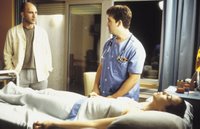Coma has an enduring appeal in cultural representations of matters medical. An individual poised precariously between
 life and death is imbued with dramatic potential, but it is the psychic aspects of coma which is liberating for novelists, dramatists and screenwriters. To enter the head of the comatose is to experience a heady cocktail of memory, fantasy and hallucination: the subconscious can be well and truly mined with no obligation to consistency or a stable reality. Anything can happen. This is brilliantly exploited in the TV series 'Life on Mars'. The title warns of its improbability. DCI Sam Tyler is put into a
life and death is imbued with dramatic potential, but it is the psychic aspects of coma which is liberating for novelists, dramatists and screenwriters. To enter the head of the comatose is to experience a heady cocktail of memory, fantasy and hallucination: the subconscious can be well and truly mined with no obligation to consistency or a stable reality. Anything can happen. This is brilliantly exploited in the TV series 'Life on Mars'. The title warns of its improbability. DCI Sam Tyler is put into a coma by a car accident and finds himself living a parallel life in the 1970s. It's a daft concept, but it works as a vehicle for juxtaposing 1970s with 21st-century policing -- without resorting to a tardis. And who could forget the series finale of House in which coma-induced hallucination had us all going for half the episode. 'It was all a dream' is usually a heckuva cop-out in event-driven drama, but if cleverly done, it enriches characterisation. We learnt a lot about House's motivations and alter-ego by getting inside his head.
coma by a car accident and finds himself living a parallel life in the 1970s. It's a daft concept, but it works as a vehicle for juxtaposing 1970s with 21st-century policing -- without resorting to a tardis. And who could forget the series finale of House in which coma-induced hallucination had us all going for half the episode. 'It was all a dream' is usually a heckuva cop-out in event-driven drama, but if cleverly done, it enriches characterisation. We learnt a lot about House's motivations and alter-ego by getting inside his head.Sam's and House's prognoses for returning to 'reality' is rather good. A study published in the BMJ last year found that your chances of recovering from coma on TV is much higher than in real life. In their study of American TV soaps, of 64 people suffering comas, only 6% died: the actual death rate is 67%. Only 7% of coma victims return to full function, but on TV a whopping 89% suffer no ill effects from trauma-induced coma. The authors conclude that soap operas generate unrealistic perceptions of favourable outcomes from coma in the viewing public. Another study published in the journal Neurology criticised feature films for a lack of realism. In 30 films featuring coma since 1970, 60% of patients had sudden, unproblematic awakenings, and the authors criticised the 'sleeping beauty' appearance of coma victims in film (beautific, peaceful sleep with eyes closed). Only two films were singled out for 'accuracy': 'Reversal of Fortune' and 'The Dreamlife of Angels'.
Coma is well covered in literature. One of the most recent offerings is 'The Coma' by bestselling author of 'The Beach', Alex Garland. I remain unconvinced of the merits of the story, but the book is worth buying for the stunning woodcuts by Garland's father which punctuate the text. Then there is the weird 'Girlfriend in a Coma' by Douglas Copeland in which a 17-year-old spends two decades oblivious to a changing world. Recently published and garnering excellent reviews on Amazon, is 'Notes from a Coma' by Irish novelist Mike McCormac. In this sto
 ry, induced coma is explored as an option for the EU penal system -- but it turns reality show when the project is televised.
ry, induced coma is explored as an option for the EU penal system -- but it turns reality show when the project is televised.One of my favourite ever films is 'Talk To Her' by acclaimed Spanish director Pedro Almodovar. Here, we follow the fates of men devoted to two women in comas. An ethical dilemma is brilliantly set up as part of the plot, but the whole movie is a masterpiece of cinematography, fine acting and an excellent script.
My personal roundup of coma-inspired literature and drama would not be complete without a mention of Robin Cook's thriller 'Coma'. I read it in my teens and it was a nailbiting awakening to the dark side of medicine.
Anyone else have suggests for the coma genre?
No comments:
Post a Comment